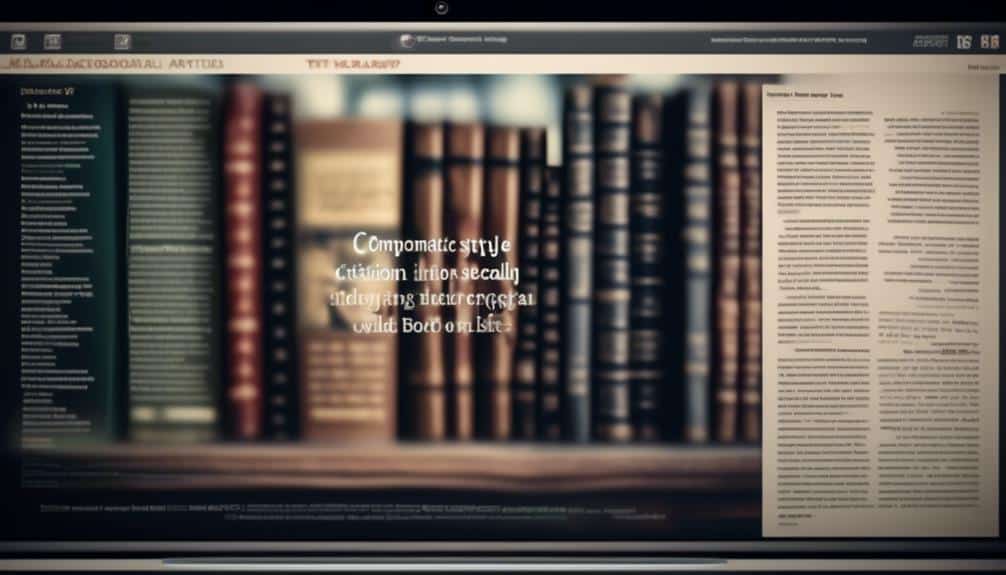Citation and Attribution: Best Practices for Content Integrity
When navigating the intricate landscape of content creation, citations and attributions act as the compass guiding you through the labyrinth of information.
The intricate dance between acknowledging sources and maintaining content integrity is paramount in establishing credibility and respect in any academic or professional work.
In a world filled with vast pools of knowledge and ideas, ensuring that your content stands on a solid foundation of proper citations is not just a formality but a mark of your commitment to authenticity and intellectual honesty.
Stay tuned to discover the key strategies that will elevate your content creation process and safeguard your work from the pitfalls of inadequate attribution.
Key Takeaways
- Proper citation is essential for maintaining content integrity and credibility.
- Understanding plagiarism is crucial to avoid using others' work without acknowledgment.
- Consequences of plagiarism can include academic penalties, legal ramifications, and career implications.
- Utilizing tools like Zotero, EndNote, Mendeley, and RefWorks can aid in managing references and streamlining citation processes.
Importance of Proper Citation

Proper citation is a fundamental aspect of maintaining content integrity and credibility in all forms of writing. It ensures that credit is given where it's due, acknowledging the original creators of ideas, concepts, and information. Proper attribution not only upholds ethical standards but also fosters a culture of respect and honesty within the academic and creative communities.
Citation ethics play a crucial role in distinguishing between original work and borrowed content. By providing clear references to the sources you have used, you demonstrate transparency and integrity in your writing. This practice also helps readers to verify the information presented and delve deeper into the subject matter if they wish to do so.
Innovative writing thrives on the foundation of proper citation. It allows for a seamless integration of diverse viewpoints and expertise, enriching the overall quality of the content. By embracing citation ethics, you not only uphold the principles of academic integrity but also contribute to the advancement of knowledge in your field.
Understanding Plagiarism
To maintain content integrity, you must grasp the concept of plagiarism – the act of using someone else's work without proper acknowledgment.
Understand the severe consequences of plagiarism, including damage to your credibility and legal ramifications.
Implement strategies like proper citation and paraphrasing to avoid plagiarism and uphold the integrity of your content.
Plagiarism Definition
Understanding what constitutes plagiarism is crucial for maintaining content integrity in any writing or creative work. Plagiarism isn't just about copying someone else's work; it also involves presenting ideas, words, or concepts without proper attribution.
Here are some key points to help you grasp the concept of plagiarism:
- Academic Dishonesty: Plagiarism is a form of academic dishonesty that can have serious consequences.
- Ethical Writing: Ethical writing involves giving credit where it's due and respecting the intellectual property of others.
- Proper Attribution: Always cite the sources you use in your work to avoid plagiarism.
- Consequences: Plagiarism can lead to damaged reputations, legal issues, and academic penalties.
Consequences of Plagiarism
Plagiarism is a serious violation that can result in significant repercussions, particularly when it comes to the consequences of such actions. Engaging in academic dishonesty by plagiarizing content can lead to severe penalties that may harm your academic and professional reputation. Here are some of the consequences you may face:
| Consequences | Description |
|---|---|
| Academic Penalties | Possible failing grades, suspension, or expulsion. |
| Legal Ramifications | Copyright infringement lawsuits or fines. |
| Career Implications | Damage to future job prospects and reputation. |
| Ethical Repercussions | Strain on personal integrity and relationships. |
Understanding the ramifications of plagiarism is crucial to maintaining your academic and professional integrity.
Ways to Avoid
Avoiding plagiarism is essential for maintaining academic integrity. This involves conducting thorough research, citing sources properly, and paraphrasing information carefully to guarantee originality. Key strategies to prevent plagiarism include crediting the original authors, using quotation marks for direct quotes, effectively paraphrasing content while acknowledging the source, and adhering to specific citation styles such as APA, MLA, or Chicago.
Guidelines for In-text Citations
When it comes to in-text citations, remember to properly cite your sources to give credit where it's due, acknowledge the original authors, and maintain the integrity of your content.
Failure to cite sources can lead to plagiarism and compromise the trustworthiness of your work.
Properly Citing Sources
To ensure the credibility of your work, always include proper in-text citations when referencing external sources. When citing sources within your text, remember the following guidelines for accurate attribution:
- Source Verification: Double-check the authenticity and reliability of the information you're citing.
- Attribution Etiquette: Clearly attribute ideas, quotes, and data to their respective sources.
- Consistency: Maintain a consistent citation style throughout your work.
- Clarity: Make sure your in-text citations are easily identifiable and lead the reader to the full source in your references.
Acknowledging Original Authors
Maintaining the integrity of your citations involves not only verifying sources but also properly acknowledging the original authors through clear and consistent in-text citations. Acknowledging ownership is crucial in showing respect for the ideas and work of others.
When incorporating someone else's ideas or words into your content, ensure that you provide proper attribution within the text. This can be achieved by including the author's name and the publication year in parentheses after the relevant information. For direct quotations, it's essential to include the page number as well.
Maintaining Content Integrity
Properly acknowledging original authors through clear and consistent in-text citations is essential for maintaining content integrity. When it comes to in-text citations, ensuring content validation and source verification is crucial for upholding the integrity of your work.
To achieve this, here are some key guidelines to follow:
- Verify Sources: Double-check all sources to guarantee their accuracy and credibility.
- Maintain Attribution Accuracy: Make sure the attribution of ideas or quotes is correctly assigned to the original author.
- Consistency is Key: Use a consistent citation style throughout your work to avoid confusion.
- Timely Updates: Regularly update your citations to reflect any changes or additions to your reference materials.
Importance of Acknowledging Sources
Acknowledging sources is crucial for ensuring the credibility and integrity of your content. Academic honesty and ethical writing are fundamental principles that underpin the importance of acknowledging sources in your work. By properly citing the sources you use, you not only give credit to the original creators but also demonstrate your own integrity as a content creator.
When you acknowledge your sources, you show respect for the intellectual property of others and uphold the ethical standards of scholarly and creative work. This practice not only strengthens the validity of your content but also fosters a culture of transparency and trust within your field.
Moreover, acknowledging your sources allows readers to trace the origins of ideas, verify the accuracy of information, and delve deeper into the subject matter. It also acknowledges the contributions of researchers, authors, and creators who've influenced your work, thereby enriching the scholarly conversation.
In essence, by acknowledging your sources, you uphold the principles of academic honesty and ethical writing, while also contributing to the overall integrity and credibility of your content.
Using Citation Styles Correctly

To ensure the credibility and integrity of your content, it's essential to adhere to proper citation styles when referencing sources. Correctly using citation styles is crucial in avoiding common citation errors and ensuring accurate citation formatting.
Here are some key points to consider:
- Consistency: Make sure to use the same citation style throughout your document to maintain uniformity and clarity.
- Accuracy: Double-check all citations to ensure they're correct and lead to the intended sources.
- Proper Formatting: Follow the specific guidelines of the citation style you're using (e.g., APA, MLA, Chicago) for in-text citations, bibliography, and reference list.
- Plagiarism Prevention: Proper citation styles not only give credit to the original authors but also help in avoiding plagiarism issues.
Avoiding Common Attribution Mistakes
When attributing sources in your content, be mindful of common mistakes that can compromise the integrity and credibility of your work. One of the most prevalent attribution errors is failing to provide citations for direct quotes or paraphrased information. Always remember to attribute any borrowed content to its original source to avoid plagiarism and uphold ethical writing practices.
Another common pitfall is improper citation formatting, such as mixing different citation styles within the same document. Consistency is key to ensuring clarity and professionalism in your work.
Additionally, overlooking attribution for images, charts, or graphs used in your content can lead to copyright infringement issues. Make sure to give proper credit to visual elements that aren't your original creations.
Tools for Citation Management

For efficient management of citations in your content, consider utilizing specialized tools designed to streamline the process and maintain accuracy and consistency. Citation management and reference organization are crucial aspects of creating reliable and well-supported content. To make this task easier and more efficient, here are some innovative tools you can leverage:
- Zotero: A powerful tool that helps you collect, organize, cite, and share your research sources.
- EndNote: Enables you to search online bibliographic databases, organize references, and create bibliographies for your research papers.
- Mendeley: Combines reference management with academic social networking to help you organize your research, collaborate with others online, and discover the latest research.
- RefWorks: An online research management, writing, and collaboration tool designed to help researchers at all levels easily gather, organize, store, and share information while ensuring accuracy in citation and reference lists.
Ensuring Content Integrity
Utilize robust content verification methods to uphold the integrity of your work and ensure its reliability and trustworthiness. Content validation and source verification are crucial steps in ensuring the accuracy and credibility of your content. By verifying the sources you use and validating the information you present, you establish authenticity assurance for your work.
When conducting research or creating content, always prioritize citation validation. Make sure to accurately attribute information to its original sources, providing your readers with a clear path to verify the information independently. This not only adds credibility to your work but also demonstrates transparency and integrity in your content creation process.
To further ensure content integrity, consider implementing tools and technologies that can aid in source verification and content validation. These resources can streamline the verification process, making it more efficient and effective, ultimately enhancing the overall quality of your work. Remember, maintaining content integrity is paramount in building trust and credibility with your audience.
Frequently Asked Questions
How Can I Determine Which Citation Style to Use for My Research Paper?
When deciding on citation styles for your research paper, consider your field's preferences, your instructor's guidelines, and the requirements of the publication you aim for. Ensure consistency throughout for clarity and professionalism.
What Are Some Common Challenges Faced When Citing Sources in Academic Writing?
When citing sources in academic writing, you may face challenges like avoiding plagiarism, ensuring accuracy, proper referencing, and maintaining research integrity. These hurdles can be overcome with attention to detail and adherence to best practices.
Is It Necessary to Provide Citations for Commonly Known Facts or Information?
Yes, it's necessary to provide citations even for common knowledge. This helps prevent plagiarism and adds credibility to your work. Clear citation practices can avoid confusion and ensure your ideas are properly acknowledged.
How Can I Ensure That I Am Properly Attributing Sources in a Group Project or Collaborative Work?
To ensure proper attribution in group projects, adopt collaborative citation strategies. Acknowledge sources transparently and consistently throughout your work. This fosters trust and respect among team members, enhancing the integrity and credibility of your project.
Are There Any Tools or Software Available to Help With Managing Citations and References?
You can streamline your citation management with reference tools like Zotero or Mendeley. These tools help organize and generate citations effortlessly, ensuring accuracy and saving you time when managing your references in group projects or collaborative work.
Conclusion
In conclusion, proper citation and attribution are crucial for maintaining content integrity. By following guidelines for in-text citations, acknowledging sources, and using citation styles correctly, you can avoid plagiarism and ensure that your work is credible and reputable.
Remember to utilize tools for citation management to streamline the process and always prioritize giving credit where it's due. Upholding these best practices will help you uphold the highest standards of academic and professional integrity.








